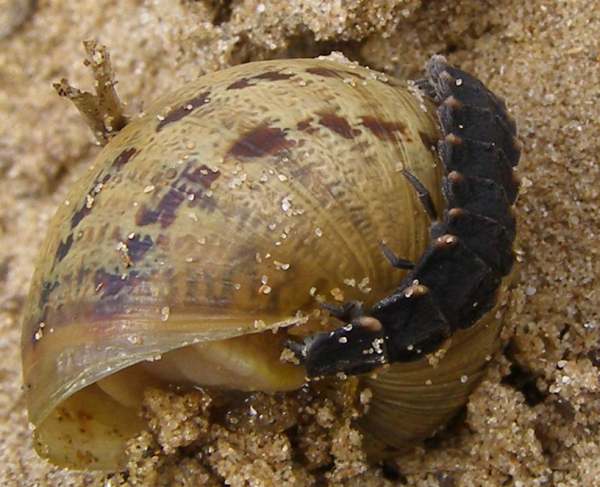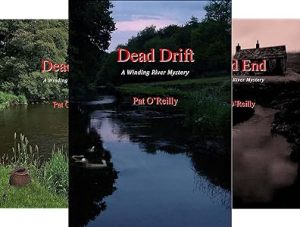Lampyris noctiluca - Glow-worm
Phylum: Arthropoda - Class: Insecta - Order: Coleoptera - Family: Lucanidae

Glow-worm larva feeding on a snail
There are many glow-worm species worldwide, but Lampyris noctula is the one most likely to be seen in Britain and Ireland. Despite its common name, it is not actually a worm but rather a kind of beetle. A larva is pictured below:

Description
The larva has distinctive pale spots on either side of the rear edge of its body segments - the picture shows a larva; however, as seen below, the adult female, which is wingless, looks very similar to the larva but lacks the pale spots.

Females are up to 25mm in length, while the smaller males are typically 18 mm long.
The females use bioluminescence to attract the males. The picture below is all that you see with the naked eye:

A flash photograph reveals the glowing insect:

The rear two segments of females glow for just a few nights in the period between June and mid August (but note that individual adults live for just two or three weeks), to attract the males, which can fly.

Male Glow-worms are rather more like the kinds of beetles that most people are familiar with: they are brown and have wings covered by longitudinally-ribbed blackish wing cases (elytra). Generally, adult male Glow-worms do not glow.
Life cycle
After laying its eggs, the female Glow-worm dies. The eggs hatch after a few weeks, and tiny larvae about 3mm in length feed on small slugs and snails, killing them by injecting them with toxins that paralyse and eventually dissolve the soft body tissue of the slug or snail. Larvae may take two or even three years to grow to maturity.
References
Harde K.W. & Severa F. (1984) Field Guide in Colour to Beetles. Littlehampton Book Services.
Acknowledgements
This page includes pictures kindly contributed by Betty and Tony Rackham.
Excited by rivers and streams? So are we, and we're pretty sure you would find the Winding River Mystery trilogy of action-packed thrillers gripping reading too. Dead Drift, Dead Cert, and Dead End are Pat O'Reilly's latest river-based novels, and now they are available in ebook format. Full details on our website here...
Buy each volume in ebook format for only £2.47 on Amazon... Paperbacks also available on Amazon at £6.95 each. All proceeds go towards keeping the First Nature website online.
Please Help Us: If you have found this information interesting and useful, please consider helping to keep First Nature online by making a small donation towards the web hosting and internet costs.
Any donations over and above the essential running costs will help support the conservation work of Plantlife, the Rivers Trust and charitable botanic gardens - as do author royalties and publisher proceeds from books by Pat and Sue.
